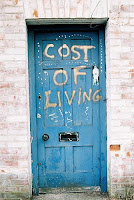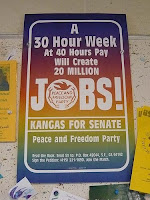
Too often, opponents of sex education in schools make a slippery slope argument when talking about teen sex. (We promise this does have something to do with economics). The argument goes like this: "Handing out condoms in schools will encourage teen sexual activity, therefore, handing out condoms is a bad idea."
True, it is a fallacious argument, but that doesn't mean that the conclusion is necessarily wrong. You have to look at
incentives. Most teens will either have sex or not have sex regardless of whether or not they are using birth control. However, a small few would be afraid to have sex because they might get pregnant. With the possibility that they could have sex and have far less risk of getting pregnant, they might be open to the risk versus the reward. In other words, there is no absolute that birth control is completely neutral in regard to teen decision-making. This is all the more reason to allow parents, who know their children better than anyone else, to make the decisions about sex education with their children.
Opponents of this view would argue that it’s best to cover all the bases. For what purpose? To reduce teenage pregnancies? While proponents consider sex education to be one of the primary tools to help teens avoid unintended pregnancies
1, it has certainly had an opposite effect since being instituted. In fact, pregnancy in teenage girls had been declining in the late 50's and early 60's
2 when sex education was being called for to solve a so-called teenage "crisis". So, after the government implemented sex education programs, what were the results? The pregnancy rate among 15 to 19 year old females rose from approximately 68 per thousand in 1970 to approximately 96 per thousand by 1980.
3 More recently, the rate declined to 75 pregnancies per thousand females aged 15 to 19.
4 Although this is a decrease from the 1990's, it is still higher than the years prior to sex education programs. So, what could have caused the recent declines in teen pregnancy? Sex education was provided throughout this time. Abortion was legal throughout this time. Perhaps the decrease is due to more widespread abstinence programs like
True Love Waits, or better education about HIV transmission. Maybe some improvement in sex education played a role. However, we are still not getting the desired results after 30+ years of this public policy.
Sargent Shriver, former head of the Office of Economic Opportunity, which led the early charge for more sex education and "family planning" clinics, testified candidly to a congressional committee in 1978:
"Just as venereal disease has skyrocketed 350% in the last 15 years when we have had more clinics, more pills, and more sex education than ever in history, teen-age pregnancy has risen."5
Am I saying that sex education was the cause of the rise in pregnancies? No. Since
correlation is not causation, there is no proof that sex education is the cause. However, it is obvious that sex education programs do not succeed in their goal of reducing teenage pregnancies and the spreading of sexually transmitted diseases.
Describing these sexual education programs, a congressional committee report said:
"The primary objective of Federal efforts in family life and sex education has been to reduce unwanted pregnancy rates among teenagers, while the primary goal of most sex educators appears to be encouragement of healthy attitudes about sex and sexuality."6
An article in the Chicago Sun Times stated,
"A popular sex instructional program for junior high school students, aged 13 and 14, shows film strips of four naked couples, two homo-sexual and two heterosexual, performing a variety of sexually explicit acts, and teachers are warned with a cautionary note from the sex educators not to show the material to parents or friends: "Many of the materials of this program shown to people outside the context of the program itself can evoke misunderstanding and difficulties."7
Dissenters can always dismiss this evidence as "right wing propaganda", but the fact is that sex education programs have not reduced teen pregnancies or sexually transmitted diseases which is their purpose. Instead, they preempt parents' decisions as to when and how their children are introduced to sex. Perhaps it was inappropriate for the former head of the Office of Economic Opportunity to lead the original charge for sex education. However, now that taxpayers are funding efforts to reduce teen pregnancy, they should demand that lawmakers provide a more effective alternative. To date, the most effective way to prevent pregnancy and the spreading of STD's is abstinence. For this reason, we support teaching abstinence and the limitations of traditional birth control (such as condoms) as part of sex education.
For more information about
abstinence education and comprehensive sex education visit parentsfortruth.org or the possible role of money with certain sex education groups
here. Also, check out the
economic implications of teen pregnancy.
Sources:
1. Theodore Ooms, Teenage Pregnancy in a Family Context, pp. 39-40, cited in Thomas Sowell,
The Vision of the Anointed.

2. ibid. Jacqueline Kasun, The War against Population, p. 144.
3. ibid. Jacqueline Kasun, The War against Population, pp. 142, 144.
4. Guttmacher Institute, U.S. Teenage Pregnancy Statistics: National and State Trends and Trends by Race and Ethnicity, accessed Sept. 12, 2006.
5. Thomas Sowell, The Vision of the Anointed, p. 18.
6. ibid. Fertility and Contraception in the United States: Report Prepared by the Select Committee on Population (Washington, D.C.: U.S. Government Printing Office, 1978), p. 5.
7. ibid. Suzanne Fields, " 'War' Pits Parents vs. Public Policy," Chicago Sun Times, October 17, 1992, p. 19.
 There are many costs of production in developing products for the marketplace. Our economic goal should be to lower costs of production to make products more affordable for everyone.
There are many costs of production in developing products for the marketplace. Our economic goal should be to lower costs of production to make products more affordable for everyone.











